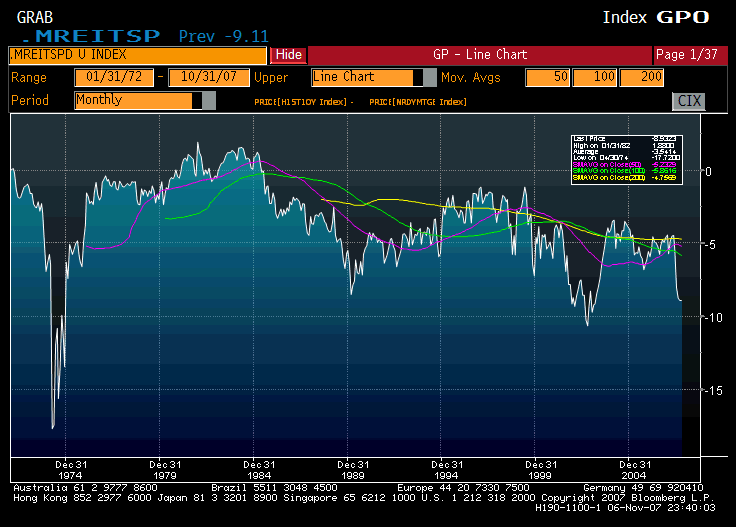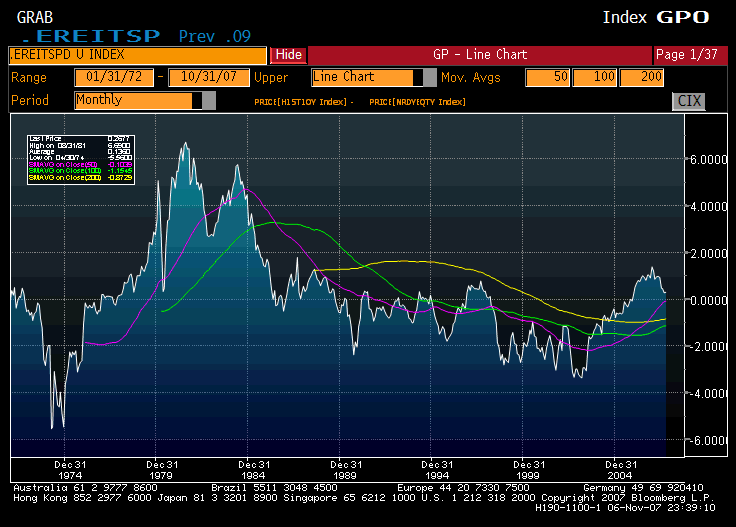Here’s another recent post from RealMoney:

 |
 |
David Merkel |
| Contemplating Life Without the Guarantors |
11/1/2007 1:30 PM EDT
 |
Hopefully this post marks a turning point for the Mortgage Insurers and the Financial Guarantee Insurers, but when I see Ambac trading within spitting distance of 50% of book, I cringe. I’ve never been a bull on these companies, but I had heard the bear case for so long that my opinion had become, “If it hasn’t happened already, why should it happen now?” Too many lost too much waiting for the event to come, and now, perhaps it has come. But, what are all of the fallout effects if we have a failure of a mortgage insurer? Fannie, Freddie, and a number of mortgage REITs would find their credit exposure to be considerably higher. The Feds would likely stand behind the agencies, because Fannie and Freddie aren’t that highly capitalized either. That said, I would be uncomfortable owning Fannie or Freddie here; just because the government might stand behind senior obligations doesn’t mean they would take care of the common and preferred stockholders, or even the subordinated debt.
Fortunately, the mortgage insurers don’t reinsure each other; there won’t be a cascade from one failure, though the same common factor, falling housing prices will affect all of them.
Other affected parties will include the homebuilders and the mortgage lenders, because buyers without significant down payments will be shut out of the market. Piggyback loans aren’t totally dead, but pricing and higher underwriting standards restrict availability. Third-order effects move onto suppliers, investment banks and the rating agencies. More on them in a moment… this will have to be a two-parter, if not three.
Position: none
And since then, the mortgage insurers have fallen a bit further.? On to part two, the financial guarantors:
Unfortunately, the financial guarantors have had a tendency to reinsure each other.? MBIA reinsures Ambac, and vice-versa. ? RAM Holdings reinsures all of them.? The guarantors provide a type of “branding” to obscure borrowers in the bond market.? Rather than put forth a costly effort to be known, it is cheaper to get the bonds wrapped by a well-known guarantor; not only does it increase perceived creditworthiness, it increases liquidity, because portfolio managers can skip a step in thinking.
Now, in simpler times, when munis were all that they insured, the risk profiles were low for the guarantors, because munis rarely defaulted, particularly those with economic necessity behind them.? In an era where they insure the AAA portions of CDOs and other asset-backed securities, the risk is higher.
Now, guarantors only have to pay principal and interest on a timely basis.? Mark to market losses don’t affect them, they can just pay along with cash flow.? The only trouble comes if they get downgraded, and new deals become more scarce.? Remember CAPMAC?? MBIA bought them out when their AAA rating was under threat.? Who will step up to buy MBIA or Ambac?? (Mr. Buffett! Here’s your chance to be a modern J. P. Morgan.? Buy out the guarantors! — Never mind, he’s much smarter than that.)
Well, at present the rating agencies are re-thinking the ratings of the guarantors.? This isn’t easy for them, because they make so much money off of the guarantors, and without the AAA, business suffers.? If the guarantors get downgraded, so do the business prospects of the ratings agencies (Moody’s and S&P).
Away from that, municipalities would suffer from lesser ability to issue debt inexpensively.? Also, stable value funds are big AAA paper buyers.? They would suffer from any guarantor getting downgraded, and particularly if Fannie or Freddie were under threat as well.?? All in all, this is not a fun time for AAA bond investors.? A lot of uncertainties are surfacing in areas that were previously regarded as safe.? (I haven’t even touched AAA RMBS whole loans…)
This is a time of significant uncertainty for areas that were previously regarded as certain.? Keep your eyes open, and evaluate guaranteed investments both ways.? I.e., ABC corp guaranteed by GUAR corp, or GUAR debt secured by an interest in ABC corp. This is a situation where simplicity is rewarded.





